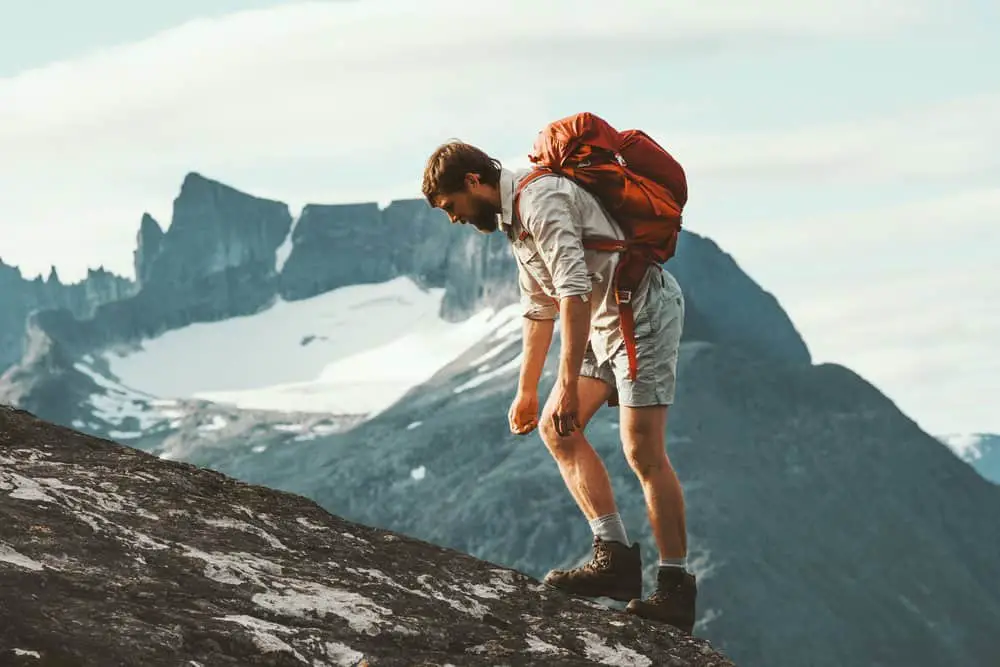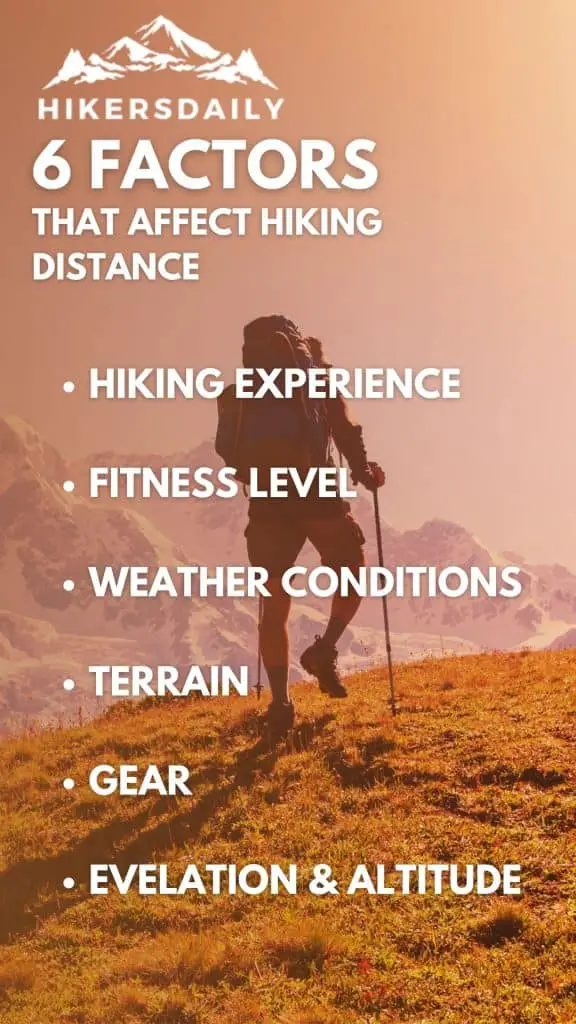How Many Miles Can You Hike in A Day? (6 Major Factors)

Whether you’re a seasoned hiker with some pretty technical hikes under your belt or a beginner looking to take it easy before you climb mountainsides, one key thing to consider before you hit the trails is just how long you’re anticipating your hike to be.
If you’re planning a thru-hike, it’s probably a good idea to know how many miles you can hike in a day to better plan your trip. But for the average hiker, it’s also good to know how long your hikes will take so you can better budget your time (and maybe even find some fellow hikers to join you).
So let’s begin!
Quick Links
6 Major Factors That Affect Your Daily Hiking Distance
Hiking Experience
Longer & harder hikes take a specific strategy to take on effectively. If you’re a beginner hiker, you’ll want to have a more straightforward approach that doesn’t involve a hike’s more technical components, such as scrambles or creek crossings.
I’ve said this before, but I’ll say it again. Don’t look at a trail difficult if you’re a beginner. They mean absolutely nothing to you. Read about the elevation, distance, and types of terrain you’ll encounter, and read trip reports.
Fitness Level
Your fitness level can ultimately affect how far you can hike in a day. If you are a beginner or you live a relatively sedentary lifestyle, odds are you’re not going to be able to hike more than five challenging miles per day. As a matter of fact, you may even want to call it quits after two to three miles depending on the difficulty of the trail.
The condition of your cardiovascular health can influence your hiking distance, which isn’t something to feel bad about; it’s just something to think about.
In general, fitter hikers will be able to cover more ground than those less fit. If you know you aren’t in the best shape, start off with some smaller hikes to get your body used to physical activity.
Weather Conditions
Weather conditions will also affect how far you hike in a day. Weather is something that will always be out of your control, so it’s in your best interest to check the weather forecast before you plan your hike.
Torrential rain, high wind speeds, snow, or heat can all end up putting a pretty big damper on your hiking adventures.
If you begin to see warning signs of potentially hazardous weather while you’re hiking, it’s always best to turn back and wait for another day. Although it is not impossible to hike during more intense weather, I don’t recommend it.
Terrain
This is one of the big ones. You should familiarize yourself with all the different terrains you’ll encounter while hiking.
Before you get out on your next trail, you should do your research on what kind the terrain is of the trails you plan to be traversing. Generally, a flat, smooth trail will be less taxing on the body, and you’ll have more energy to travel longer and farther.
Conversely, you’ll be exerting a lot more energy if you’re planning to hike on a trail that has a rocky surface, as they require significantly more balance and muscle engagement from you. If your fitness levels are not keeping up with the demands of the terrain, you could find yourself back home sooner than you’d like.
Gear
It shouldn’t come as a surprise that the more weight you carry on your back while on your hike, the more energy you spend. It’ll be far easier to deplete your energy reserves if you’re carrying a 25-pound hiking backpack than if you were wearing a 2-pound fanny pack with your basic hiking needs.
To save your energy and keep you out on the trails for longer, consider taking a smaller pack that will fit your trail essentials, such as sunscreen, water, and a light snack.
Elevation and altitude
Elevation can affect the speed at which you’re able to travel on your trail. The higher your hike, the lower oxygen levels will become. The less oxygen your body gets, the weaker you will feel and the slower you will become.
Keep in mind that once the elevation of your hike reaches over 8000 feet, a steady drop in oxygen levels will begin to ensue, leading to altitude sickness, severe headaches, and more.
When you’re trying to go the distance, it’s important to pace yourself and get a feel for where you’re at in your fitness levels and hiking experience. Take it easy if you’re a beginner, and ensure that you’re properly prepared if you decide to go for those longer hikes.

What Is the Average Daily Hiking Distance for A Beginner?
A beginner’s daily hiking distance should be based on their level of fitness, the terrain they’re hiking on, and what kind of gear they’re carrying.
As a general rule of thumb, a beginner hiker in good shape can cover 3-5 miles on easy terrain with little to no elevation gain. And I would say that can cover anywhere between 3 to 5 hours (if not more). However, that number will most likely decrease once you factor in steeper inclines, tricky footing, and a heavier backpack.
If you’re just starting out, it’s best to begin with shorter hikes close to home so that you can get a feel for what your body is capable of and how different kinds of terrain affect your hiking speed and endurance.
With a little practice, you’ll be able to better estimate how far you can hike in a day and plan your hikes accordingly. Soon enough, you’ll be an old pro at packing your bags and hitting the trails!
What Is the Average Daily Hiking Distance for An Experienced Hiker?
Okay, great! So now you’ve made it. You’re a pro hiker. So, how far can an experienced hiker hike in a day?
Again, even for an experienced hiker, many factors still come into play, such as terrain, weather, and fitness level. But as a general rule of thumb, an experienced hiker in good shape can cover 10-12 miles on easy terrain with little to no elevation gain.
The most I’ve ever hiked in a day was roughly 18 miles, but that was on relatively flat terrain, save for a few small hills here and there.
So is it possible to hike more than 12 miles in a day? Sure! But it’s important to know your limits and not bite off more than you can chew.
Can You Hike 100 Miles in A Day?
So let’s do some basic math here. The average person can walk a mile in roughly 20 minutes. That’s considered walking at a moderate pace of 3 miles per hour.
For reference, three miles per hour is about the speed of a leisurely stroll or a very slow jog.
So that means you’re covering 3 miles every hour. Not too bad, right? Now, if you wanted to hit 100 miles at this pace, it would take you approximately 33.3 hours, or roughly one day and 9 hours. So at 3 mph, with non-stop walking, you wouldn’t make the cut.
And realistically speaking – the average person can’t just walk for 33 hours straight without taking any rest. And that’s not even accounting for food and water or bathroom breaks.
Now, let’s say you can hike at a slightly faster pace of 4 miles per hour. If you maintained a 4 mph pace for 24 hours straight, you’d still fall short – by 4 miles. You’d end up at 96 miles.
At a pace faster than four mph, your walk turns into a fast jog or simply becomes running. And hiking at a “running” pace is not only incredibly difficult but also incredibly dangerous.
So, can you hike 100 miles in a day?
I think it’s safe to say that the vast majority of people could not hike 100 miles in a day, no matter how experienced they are. Personally, this isn’t a feat that I would even consider trying. And I also don’t know anyone that has ever done it.
But that’s not to say that it’s impossible. If you’re up for the challenge, more power to you!
Is It Safe to Hike Every Single Day?
Barring any injuries or health concerns, there is no reason why you can’t hike every day if that’s what you enjoy doing!
In fact, hiking daily has many benefits, such as improved cardiovascular health, increased muscle strength, and better joint mobility.
Not to mention, it’s a great way to de-stress and clear your head after a long day.
If you’re hiking for exercise – it’s been said that exercising outdoors tends to be better for you than indoors. Why? Because you’re getting fresh air and Vitamin D, both of which have been linked to improved health. Getting outside to get a good serving dose of Vitamin D from the sun can help you shine from the inside out, no pun intended.
If you’re looking to shed a couple of pounds healthily and efficiently, taking out to the trail even just a few days a week can help you see results. Hiking for 1 mile can burn up to 100 calories, and adding a little bit of weight in the form of a backpack or weighted vest, can help you burn even more.
Another great benefit to hiking frequently is the positive influence on social relationships. Some people like the peace, quiet and alone time they get to have with themselves out in nature. But for others, hiking can be a very positive influence on your social relationships!
Hiking can sometimes require some social support, such as helping each other up the sides of mountains or trails, crossing rivers, or providing moral support on a long and difficult journey. These things can create bonds that last a lifetime. When I go hiking with my wife, we always watch each other and work together as a team – which is a great way to build trust and communication.
Conclusion
If you want to go on longer trails, just get out on the trails and do it. Take a page from Nike’s book. Like with any skill, the more frequently you do it, the better you become.
And as you become more experienced, you’ll start to find what works best for you in terms of mileage and how to fuel your body so you can go the distance. Happy hiking!






